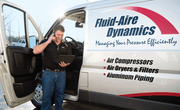1. Eliminate pressure drop: A few of the major contributors to pressure drop are inadequate pipe sizes, undersized and dirty filtration, excessive filtration, inadequate storage, and air compressor maintenance issues.
2. Install low pressure drop filtration. Using filtration that is specified for low pressure drop will help to eliminate pressure drop in your system.
3. Run your system pressure at the lowest possible PSI: If you set your system pressure to run as low as possible, while still having everything operating correctly, this will help to reduce or eliminate unnecessary air consumption. For every 2 PSI reduction in pressure, there is a 1% reduction in energy costs. Below are a few points on making this feasible.

4. Install Zero Air Loss Condensate Drains. Solenoid type timer drains are very commonly used because of their cost effectiveness and simplicity, but here is the fact: a standard timer type solenoid valve with 5/32” orifice, that is set to purge for 10 seconds every 10 minutes at 100 PSI, will use 40 cubic feet of air every hour. Based on a 24/7/365 operation and an energy cost of $0.10 per kW/h, these valves could cost you nearly $150.00 each in wasted energy per year! With this savings and the use of the ComEd Smart Ideas Program, your ROI can be less than one year if you install Zero Loss Drain Condensate Drains.
5. Variable Speed Drive Compressors are almost a “no brainer” in most every application. With the cost of the technology coming down, and the utilization of the ComEd Smart Ideas Program, the capital outlay is very low (if anything) compared to standard fixed speed machines. In addition to that, the ongoing energy savings in most cases will continue to save your company hundreds, if not thousands, of dollars per month if the machine(s) are properly sized and implemented.
6. Install cycling dryers when practical. With the energy draw being significantly lower on dryers, it rarely justifies replacement of non-cycling dryers with cycling dryers, unless replacement or repair is needed on the current non-cycling dryer(s). This is not the case if your dryer is significantly over-sized or your demand is dramatically different from season-to-season or shift-to-shift.
7. Install purge regulation/reduction on any desiccant type dryers. This is done in many different ways and is almost always done with the initial investment.
8. Install properly designed air nozzles everywhere! Use these in place of open copper tubes, pipes with holes drilled in them and other costly crude contraptions. The increase in power and reduction in compressed air is amazing!
866.435.2717
We are able to assist in engineering the ideal nozzle configuration for you.
9. Improve compressor controls and install system controllers where possible. There are many options on the market today to easily automate your air compressors. This is great for one compressor to ensure is not running during non-production hours, but is ideal in applications where you need to turn multiple machines on and off to meet plant demands. This can also be the ideal solution to a narrow pressure band which lowers overall system pressure.
10. Use low pressure blowers where possible. If you are using a considerable amount of air below 40 PSI, a low pressure commercial air compressor or a blower may be able to save up to 90% in energy cost as well and reduce industrial air compressor maintenance costs!
YOUR SYSTEM WITH.
to over 10 brands of air compressors and 7 brands of dryers. This allows us
to get the ideal air compressor for your unique application!
